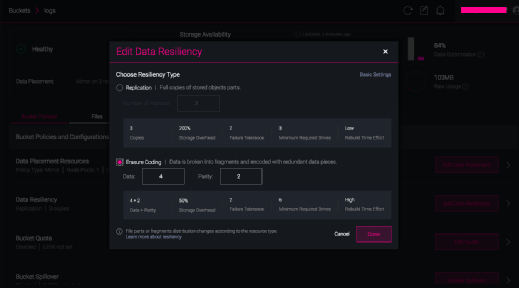NooBaa update focuses on multi-cloud data management
Software-defined object storage startup NooBaa takes on unstructured data management across multiple private and public clouds with second major product release.
Startup NooBaa shifted its focus to multi-cloud data management with the latest release of its virtual machine-based object storage software.
NooBaa this week shipped its second major product release of its eponymous software, which creates a virtual data repository that can span private and public clouds. The new release adds the ability to migrate data between Amazon Web Services (AWS) and Microsoft Azure public clouds. NooBaa also added a virtual namespace, flexible erasure coding and policies for automatic data tiering and archiving, and a microservices platform.
NooBaa software first became generally available in April 2017.
"People don't care about the storage. They care about the data; what they can do with it and how they can turn data into business," said Eran Tamir, NooBaa's vice president of product. "We want to make sure that we address the CIO's concerns and not just the storage administrator's concerns."
Tamir said genuine multi-cloud storage support is difficult to pull off, but many customers want to take a multi-cloud approach due to regulations, internal policies, or mergers and acquisitions.
"We try to simplify it in a way that it's easier to manage the data," Tamir said.
NooBaa software consists of an access node that handles the data chunking, deduplication, compression and encryption; daemon software that turns server hardware into storage nodes; and virtual-machine-based core software responsible for data placement, self-healing and monitoring.

NooBaa adds single namespace
NooBaa is adding a single namespace to provide a unified view of the multiple data repositories that can span public and/or private clouds. Tamir said NooBaa would also continue to offer full data mirroring between clouds, whether public or private.
Another new feature in the latest product version is the ability to use Microsoft's Blob API to talk to NooBaa's software. NooBaa previously supported only the Amazon S3 API on the front end. Tamir said the new Blob API capability would enable applications originally built for Microsoft's Azure cloud to write data to S3 without changing the application code.
NooBaa's new erasure coding gives customers the option to choose the number of copies they want to make for data protection based on their needs and budget. Customers can set different types of erasure coding in each bucket.
"We decided to give the flexibility within every bucket so a customer can figure out themselves what efficiencies they want to achieve and on what part of the data they want to apply that," Tamir said.
NooBaa added automatic tiering and archiving through its implementation of Amazon's S3 API lifecycle feature. A customer, for example, could set a backup policy calling for the system to delete data after 30 days, Tamir said.
New microservices platform
The NooBaa microservices platform can run anywhere as an AWS Lambda-compatible serverless service. Tamir said a customer could write code to perform a specific function on the data without having to write a big application. He said a customer might use metadata, for example, to create a thumbnail of a video.
"Their integration capabilities with external microservices is an intelligent approach to better utilizing stored data," wrote Steven Hill, a senior analyst of storage technologies at 451 Research, in an email. "Part of the efficiency of object storage lies in the ability to leverage metadata to trigger events and reduce the amount of data movement and deduplication that add to cloud storage costs."
NooBaa also added a "zero-time install" option. Customers can set up an S3 server by spinning up NooBaa core software, test application behavior, and add on-premises and/or cloud resources without any migration.
The list price for the NooBaa software product is $15 per TB per month. Customers pay only for the storage they use. NooBaa is available on AWS, Microsoft Azure, Alibaba and the Google marketplace. The company also offers a free community version to allow customers to quickly test the product.
"Multi-cloud flexibility is rapidly becoming a key objective for most object storage vendors in order to remain competitive," Hill said. "The new 'secondary' storage model that's coming into focus looks to deal with the challenges of unstructured data that may be just as mission-critical but doesn't necessarily have the same performance and availability requirements as traditional primary storage applications."
Greg Schulz, a senior advisory analyst at StorageIO, said NooBaa's competition includes hardware and software gateways that access object storage such as Microsoft/Avere, Nasuni, Ctera, Cloudberry and Panzura, as well as software-defined storage players that support object storage, including Cloudian, Elastifile and WekaIO.







